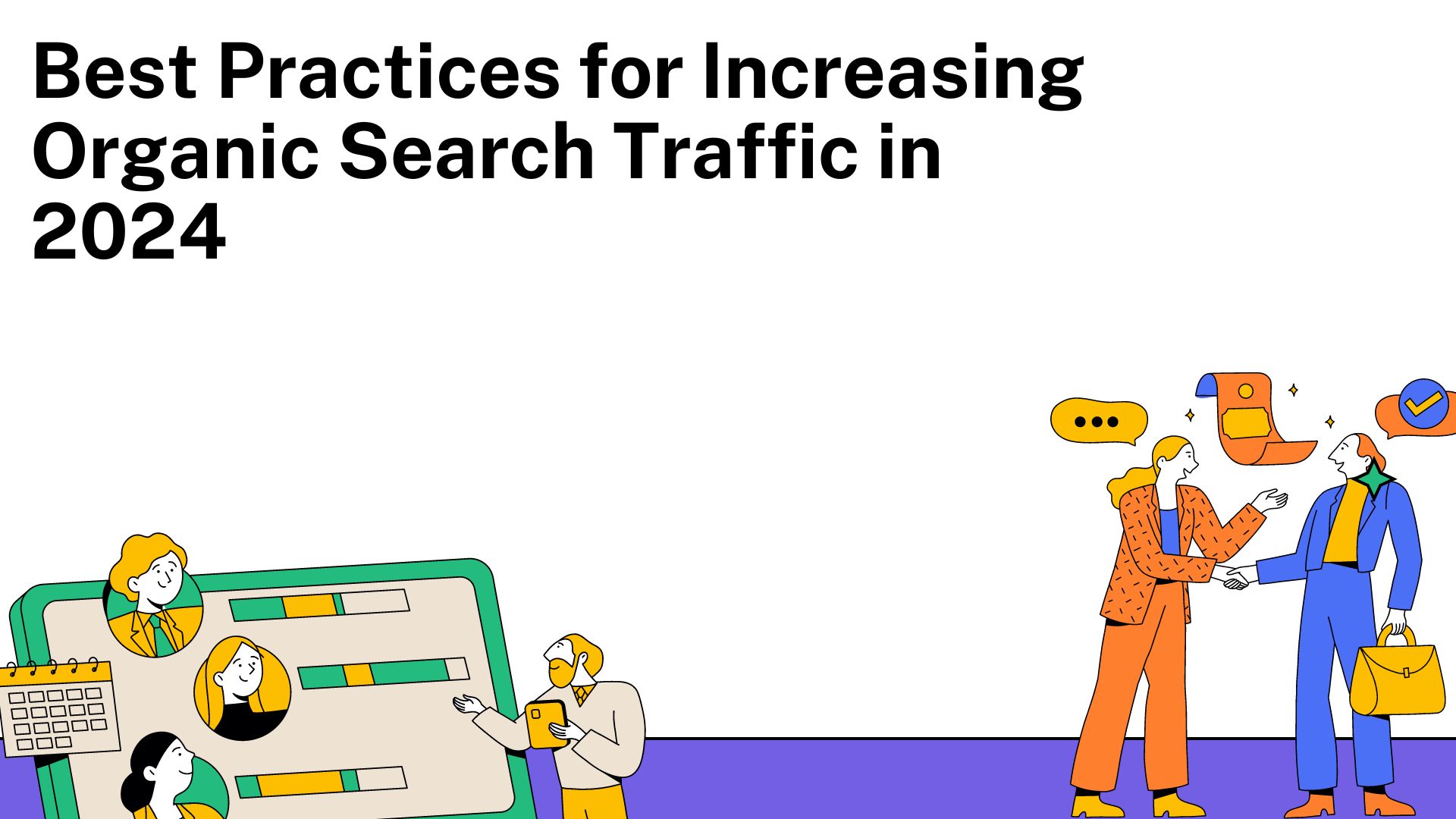Best Practices for Increasing Organic Search Traffic in 2024
In the ever-evolving digital landscape, organic search traffic remains one of the most valuable sources of website visitors. Unlike paid traffic, which requires continuous investment, organic traffic comes from people finding your website through search engines like Google, Bing, and Yahoo. This form of traffic tends to be more sustainable in the long run, offering businesses and websites a more cost-effective way to attract potential customers.
However, increasing organic search traffic requires strategic planning and a focus on search engine optimization (SEO) techniques that are up-to-date with the latest trends. In this article, we will outline the best practices for increasing organic search traffic in 2024, providing actionable tips that you can implement to improve your website’s visibility on search engines.
Why Organic Search Traffic Matters
Organic search traffic is important because it brings highly targeted visitors to your website. People using search engines are usually looking for something specific. If your website is well-optimized for the keywords and phrases that your target audience is searching for, you have a better chance of appearing in the search results and attracting those users.
Additionally, organic search traffic typically results in higher-quality leads and conversions. Since users are already looking for solutions or information relevant to what you offer, they are more likely to engage with your content, products, or services.
Understanding How Search Engines Rank Websites
Before diving into best practices for increasing organic search traffic, it’s crucial to understand how search engines rank websites. Search engines use complex algorithms to evaluate websites based on various factors, such as:
- Relevance: How closely your website’s content matches the user’s search query.
- Authority: How trustworthy and authoritative your website is, based on backlinks and other factors.
- User Experience: How well your website performs, including page load speed, mobile-friendliness, and ease of navigation.
With these factors in mind, let’s explore some of the key strategies to help improve your website’s ranking and increase organic search traffic in 2024.
Best Practices for Increasing Organic Search Traffic
1. Conduct Thorough Keyword Research
Keyword research is the foundation of any successful SEO strategy. It helps you understand what your target audience is searching for and allows you to create content that meets their needs. Here’s how to conduct effective keyword research:
- Use Keyword Research Tools: Tools like Google Keyword Planner, SEMrush, and Ahrefs can help you identify relevant keywords and phrases with a good search volume and manageable competition.
- Target Long-Tail Keywords: Long-tail keywords are more specific and usually less competitive. For example, instead of targeting the keyword “shoes,” you could target “comfortable running shoes for women.” Long-tail keywords tend to drive more qualified traffic.
- Analyze Your Competitors: Study the keywords your competitors are ranking for and identify gaps in your own strategy. This can help you uncover opportunities to target keywords they might have missed.
2. Optimize On-Page SEO Elements
On-page SEO refers to optimizing individual web pages to improve their search engine rankings. This includes optimizing the following elements:
- Title Tags: Ensure your title tags are concise and include your primary keyword. For example, a good title tag might be “Best Running Shoes for Women in 2024 | Comfortable & Affordable.”
- Meta Descriptions: Meta descriptions should provide a brief summary of the page’s content and include relevant keywords. While meta descriptions don’t directly affect rankings, they can influence click-through rates.
- Header Tags (H1, H2, H3, etc.): Use header tags to structure your content logically. The H1 tag should be used for the main title, and H2, H3, and other tags should be used for subheadings.
- Image Alt Text: Include descriptive alt text for all images to help search engines understand what the images are about and to improve your site’s accessibility.
- Internal Linking: Link to other relevant pages on your website to help search engines discover your content and understand your website’s structure.
3. Create High-Quality, Relevant Content
Content is still king when it comes to SEO. However, search engines are becoming more sophisticated in how they evaluate content quality. Here’s how to ensure your content is up to par:
- Focus on User Intent: Understand what your audience is searching for and create content that answers their questions or solves their problems. Search engines prioritize content that satisfies user intent.
- Keep Content Fresh: Regularly update your existing content to keep it relevant and up-to-date. This signals to search engines that your site is active and provides value to users.
- Use Multimedia: Incorporating images, videos, and infographics can make your content more engaging and increase the time visitors spend on your website.
4. Improve Website Performance and User Experience
User experience (UX) is a significant ranking factor for search engines. A fast, well-designed, and easy-to-navigate website will keep visitors engaged and reduce bounce rates. Here’s how to improve your website’s performance:
- Page Speed: Use tools like Google PageSpeed Insights to identify areas where you can improve your page load times. Compress images, leverage browser caching, and minimize the use of large scripts to speed up your site.
- Mobile Optimization: With more users accessing websites from mobile devices, it’s essential to have a mobile-friendly design. Google’s mobile-first indexing means your mobile site’s performance directly impacts your ranking.
- Easy Navigation: Make sure your website’s layout is intuitive and easy to navigate. Use clear calls-to-action (CTAs) and ensure that visitors can easily find what they’re looking for.
5. Build High-Quality Backlinks
Backlinks (links from other websites to your own) are a crucial factor in how search engines evaluate your site’s authority. Here’s how to build high-quality backlinks:
- Guest Blogging: Contribute guest posts to reputable websites in your industry. In exchange, you’ll usually be allowed to include a link back to your own website.
- Create Shareable Content: High-quality, informative, and engaging content is more likely to be shared by others, which can lead to natural backlinks.
- Reach Out for Links: If you’ve created valuable content, don’t hesitate to reach out to relevant websites and ask them to link to your content.
6. Leverage Technical SEO
Technical SEO focuses on improving the backend of your website to help search engines crawl and index your site more effectively. Some key technical SEO practices include:
- Fix Broken Links: Regularly check your website for broken links and fix them to prevent users from encountering errors and to maintain your site’s credibility.
- Use Structured Data: Implement schema markup to help search engines understand your content better. Structured data can also enhance your search results with rich snippets, increasing click-through rates.
- Submit an XML Sitemap: An XML sitemap helps search engines discover and index your pages more efficiently. Make sure your sitemap is up-to-date and submitted through Google Search Console.
7. Focus on Local SEO (If Relevant)
If your business has a physical location or serves a specific geographic area, local SEO is essential. Here’s how to optimize for local search:
- Claim Your Google Business Profile: Ensure that your Google Business profile is complete and accurate. This helps your business appear in local search results and Google Maps.
- Optimize for Local Keywords: Incorporate local keywords, such as your city or region, into your content and meta tags.
- Get Local Backlinks: Partner with local organizations, blogs, or media outlets to earn backlinks from reputable local sources.
8. Monitor Your SEO Performance
SEO is not a one-time effort. You need to continually monitor your performance to see what’s working and what isn’t. Use tools like Google Analytics and Google Search Console to track your website’s traffic, rankings, and other key metrics. Adjust your SEO strategy based on your performance data to continue improving over time.
Conclusion
Increasing organic search traffic requires a multifaceted approach that involves optimizing your website’s content, improving its performance, and building high-quality backlinks. By following the best practices outlined in this article, you’ll be well on your way to boosting your website’s visibility on search engines and attracting more organic visitors in 2024.
Remember, SEO is a long-term strategy, and results won’t happen overnight. However, with consistent effort and a focus on providing value to your users, you can achieve sustained growth in organic traffic. For businesses looking to get the most out of their SEO efforts, investing in organic SEO services can be a game-changer.
FAQs:
1. Why is keyword research important for increasing organic search traffic?
Keyword research is essential because it helps you understand what your target audience is searching for. By identifying relevant keywords and phrases, you can create content that matches user intent, making it easier for your website to rank higher on search engine results pages (SERPs). Targeting the right keywords also helps bring in more qualified traffic, leading to better engagement and conversions.
2. How can I improve my website’s loading speed to boost organic search traffic?
Improving your website’s loading speed can be done by compressing images, minimizing large scripts, and leveraging browser caching. Tools like Google PageSpeed Insights can help you identify areas for optimization. Faster-loading pages not only provide a better user experience but also positively impact your search rankings, as search engines prioritize websites that load quickly.
3. What role do backlinks play in organic SEO?
Backlinks are a major ranking factor in SEO. When reputable websites link to your content, it signals to search engines that your site is authoritative and trustworthy. This can significantly improve your site’s ranking on search engines and increase organic traffic. Building high-quality backlinks through guest blogging, creating valuable content, and reaching out to other websites for links is essential for boosting your SEO performance.














Post Comment